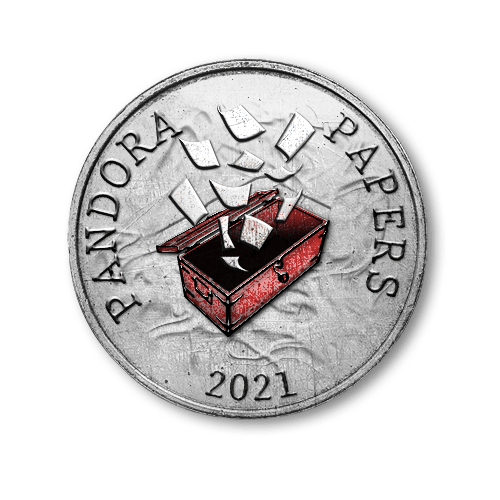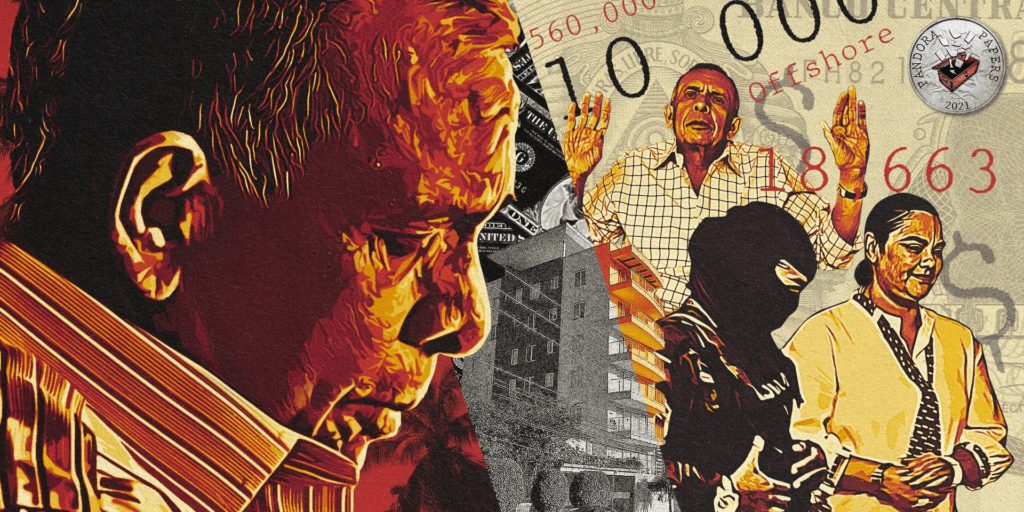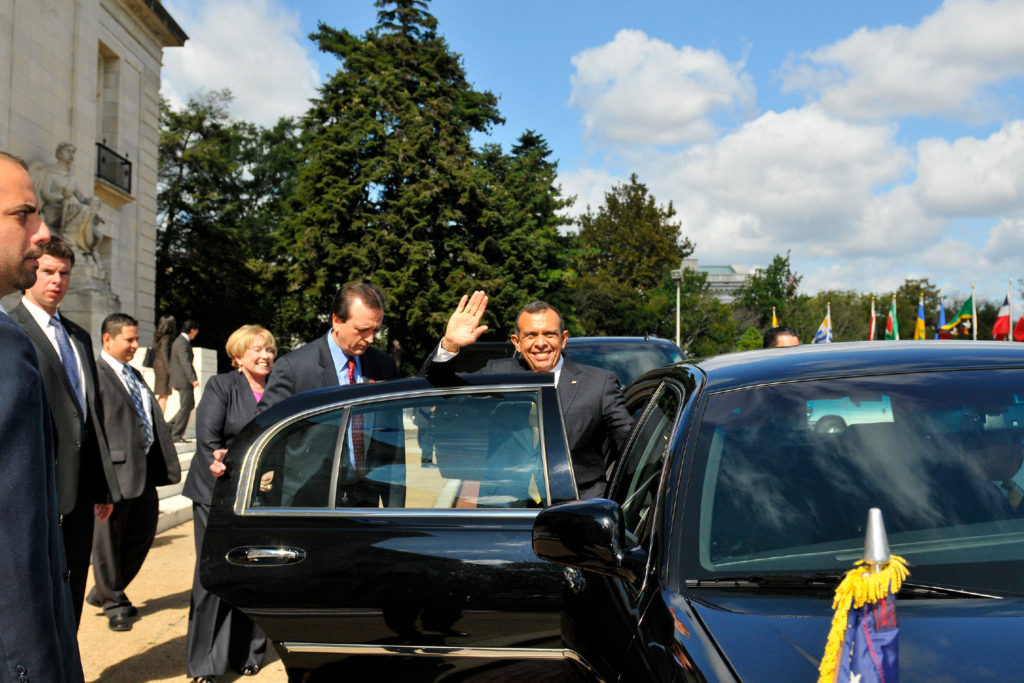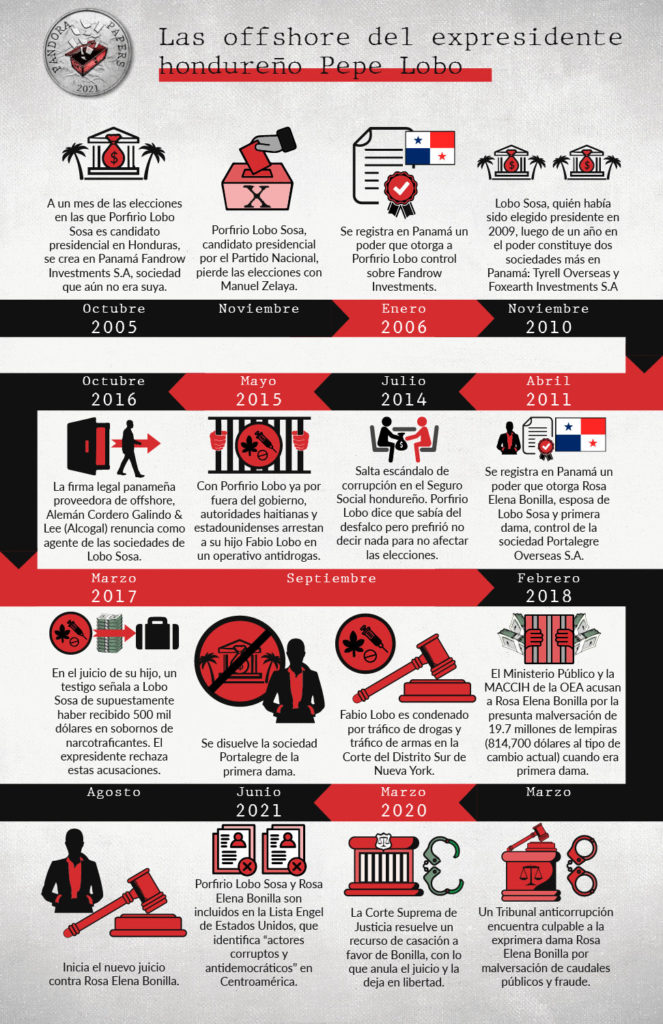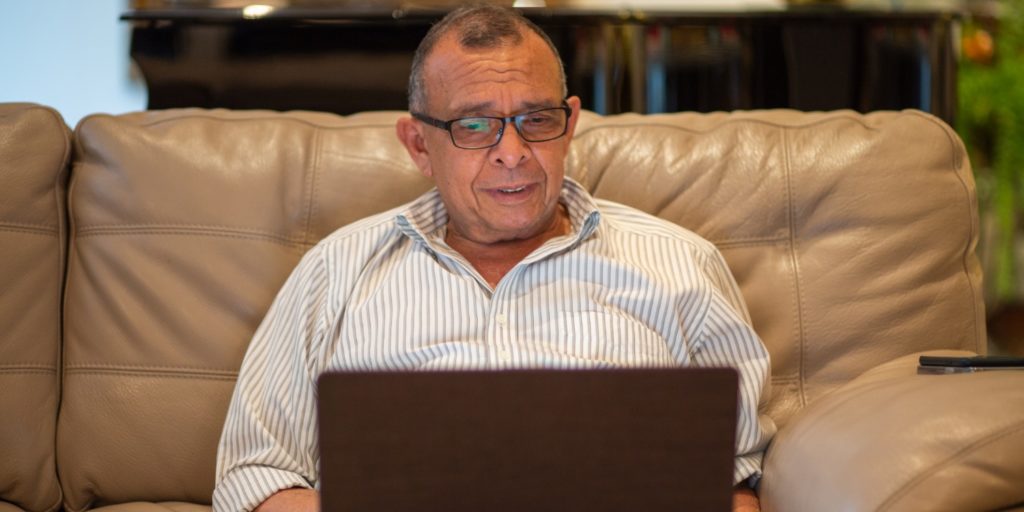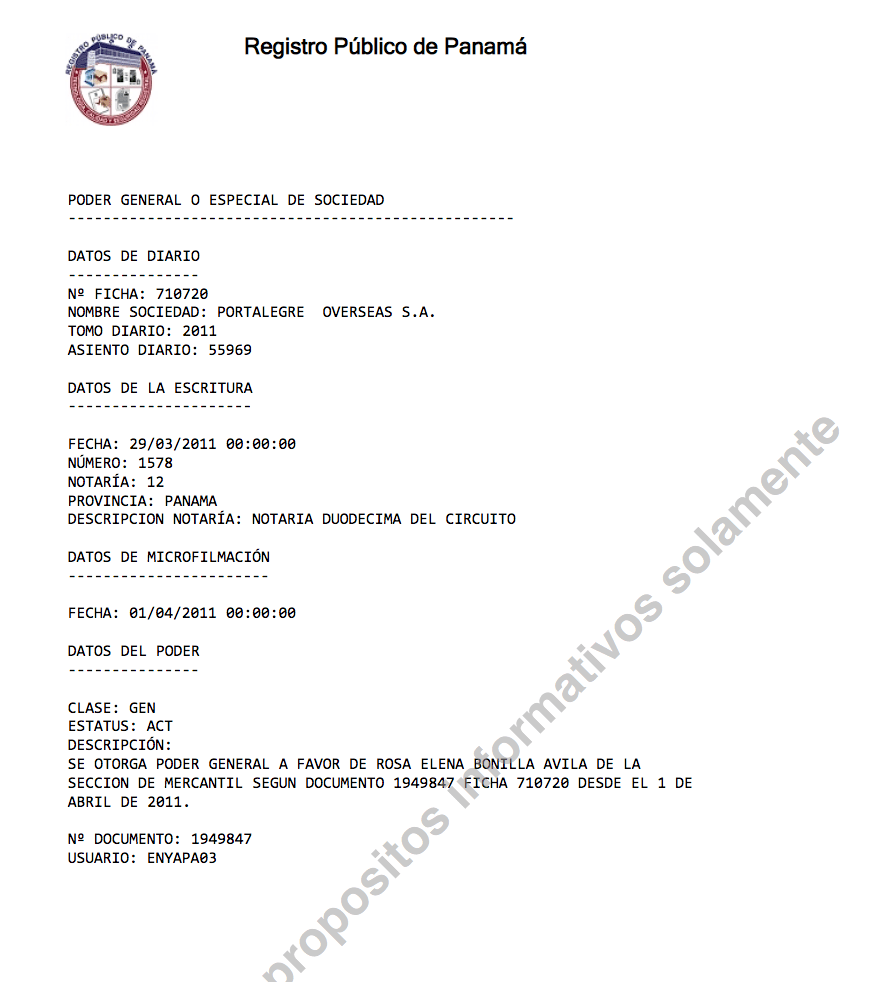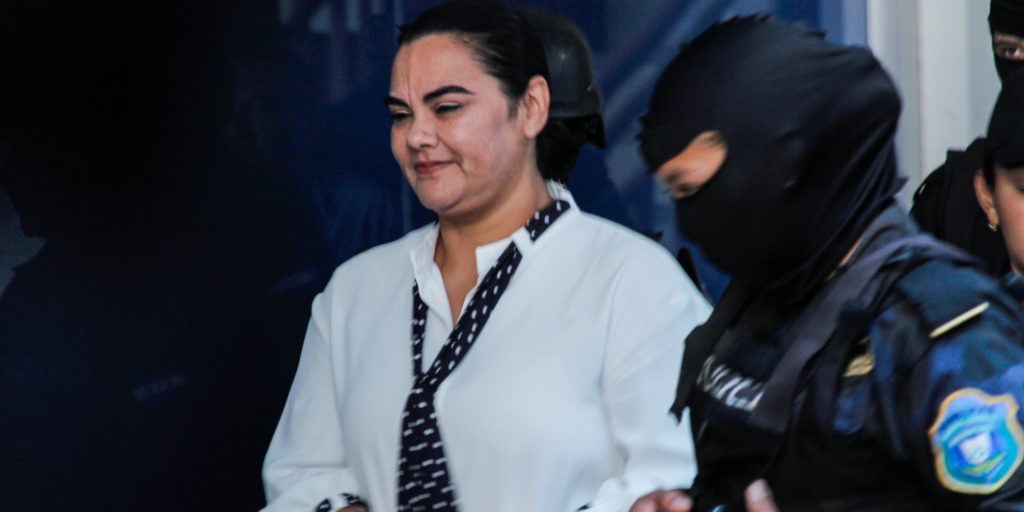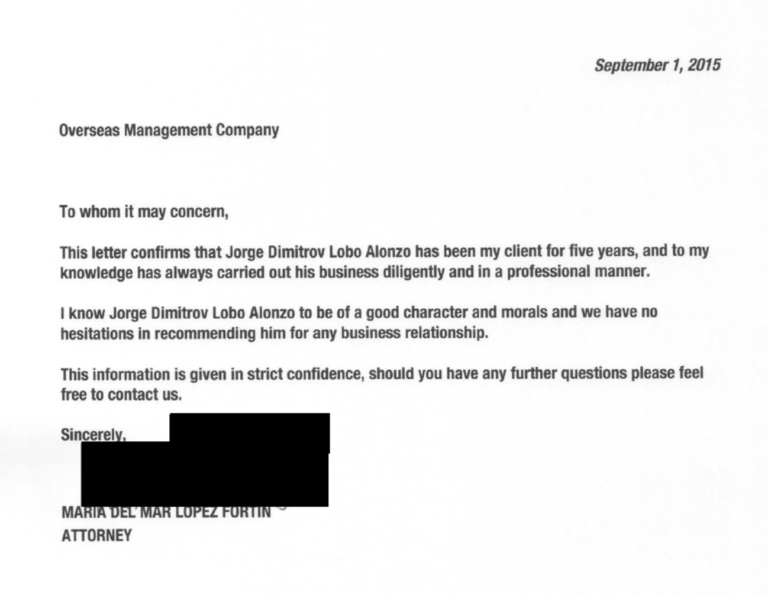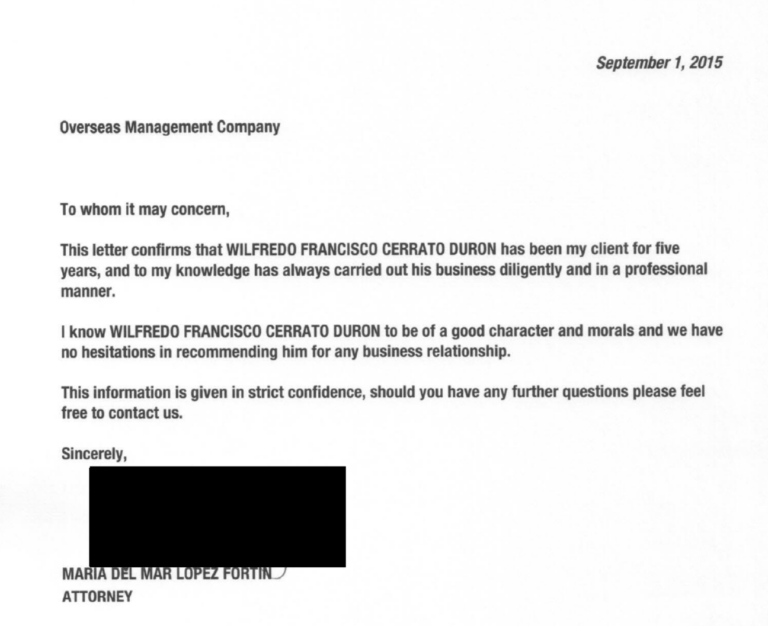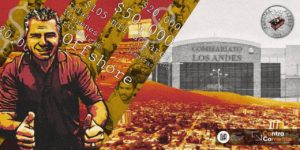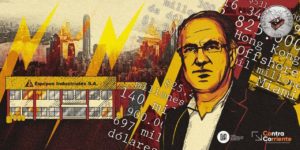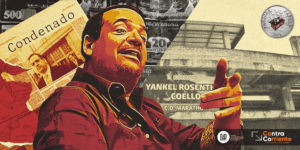An analysis of thousands of documents from the Pandora Papers has revealed that the former politician and cattle rancher owned three shell companies in Panama, and that his wife, Rosa Elena Bonilla, managed an offshore company while she was first lady. Lobo’s son and a former right-hand man both sought to create companies in tax havens. Adding to their woes, the former president and his wife were both named on the Engel List, and Bonilla is currently facing a corruption trial.
By Jennifer Avila, Andres Bermudez Lievano and Maria Teresa Ronderos*
Illustration by Miguel Méndez
Photography by Martín Cálix
Translated by: Allison Lira
Porfirio Lobo Sosa, president of Honduras from 2010 to 2014, included earlier this year on the U.S. government’s Engel List for reportedly accepting bribes from drug traffickers in exchange for political favors, maintained three offshore companies in Panama during most of his administration and at least until 2016. One company was registered two months before the 2005 presidential elections that Lobo lost, and the other two were opened during his first year in office. Lobo claims that he opened these accounts to manage loans obtained in Panama because that country offered better security and interest rates.
Lobo’s wife, Rosa Elena Bonilla, who is currently facing a corruption charge and also appears on the Engel List, controlled another Panamanian company in 2011 while she was first lady and remained linked to it at least until 2016.
Documents show that two other members of Lobo’s inner circle also tried to register two different offshore companies on the same day, one year after Lobo stepped down from the presidency. One was his son, congressperson Jorge Dimitrov Lobo Alonzo, and the other was Wilfredo Cerrato Durón, Lobo’s chief of staff during his presidency.
The fact that several people close to the former president have been or are currently under investigation for corruption raises questions about their reasons for creating offshore companies in places known for bank secrecy, even though owning such companies is not in itself evidence of any illegal activity.
These are some of the findings of an analysis of thousands of documents conducted by Contracorriente in Honduras and the Latin American Center for Investigative Journalism (CLIP). These documents pertain to several firms that specialize in managing offshore companies in Panama, the British Virgin Islands, and other countries. This report is part of an international investigation, led by the International Consortium of Investigative Journalists (ICIJ).
An anonymous source sent 2.94 terabytes of confidential financial records in separate batches to ICIJ over several months, totaling more than 11.9 million documents from 14 offshore services firms that create and manage paper companies and trusts in tax havens around the world. These Pandora Papers span 24 years from 1996 to 2020, and are in English, Spanish, Chinese, Greek, Russian and other languages. They reveal connections between companies and businesses in more than 200 countries and territories. More than 600 journalists in 117 countries collaborated on the investigation.
The former president’s companies
Porfirio Lobo Sosa is 73 years old, and – after a long political career – now dedicates himself to his farms, located in Olancho, in eastern Honduras, where he raises livestock and grows soybeans and corn. The former president spoke with this journalist team at his house in an elegant neighborhood in Tegucigalpa.
Often using cattle in his metaphors, the former president cultivates a rancher image that stands in stark contrast to his international operations. According to internal documents from the Panamanian law firm Alemán, Cordero, Galindo & Lee, better known as Alcogal, the former president has been the beneficial owner of three Panamanian offshore companies, all of which were active until the end of his administration in 2016. They had not been made public until now. Records indicate that two of the companies were created during his presidency and another one predates his election.
One company, Fandrow Investments SA, was created on October 7, 2005, according to a due diligence form for confidential information prepared by Alcogal.
The company was registered seven weeks before the 2005 presidential elections, in which the then candidate Lobo Sosa lost to Manuel Zelaya by just 73,000 votes. At that time, Lobo was also serving as an assemblymember for the department of Olancho and president of the National Congress.
While reviewing the responses he prepared for this September 9 interview on his computer, the former president told our team that he lost to Manuel Zelaya, the Liberal Party candidate, because he had “gone too far” when he asked for the death penalty for heinous crimes. “I asked for it because I came across a crime that happened in Copán and it tore me apart. A mother was murdered along with her three young children, an atrocity. But I asked for forgiveness in the second campaign,” he says.
According to a document from Alcogal, the company was created with $10,000 in capital and the same number of shares. Furthermore, the document, dated 2012 when Lobo was already president, certifies that Lobo was Fandrow’s sole shareholder.
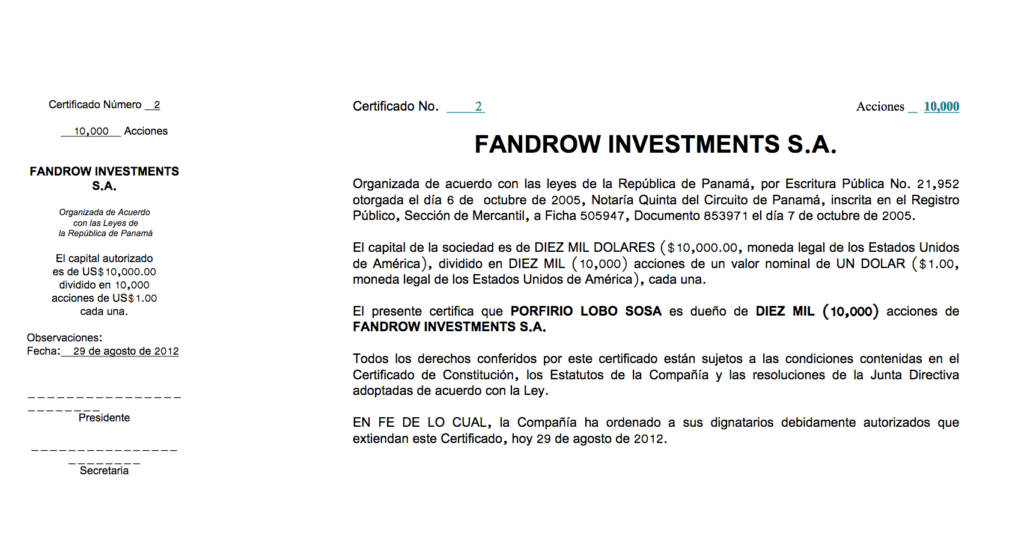
“Why are companies created abroad? To launder money or to hide it? Not that, because I am not a criminal. Everything I have, I have worked for. Most of it is inherited, I will not deny it,” says Lobo, when asked by this alliance of journalists about the creation of offshore companies. His family’s lands in Olancho, he added, are some of the largest there.
Lobo claimed that he opened companies in Panama to be safe, sharing that although he has fought against crime, the country continues to be insecure. He didn’t want to publicize properties, companies and assets because doing so could cost him his life. He also said that banks in Panama offer loans at lower interest rates than those in Honduras.
Curiously it was not former President Lobo who created Fandrow in 2005. In a letter from Alcogal, dated January 17, 2006, an officer of the firm informed a Honduran named Jacobo Atala – from the company Representaciones Financieras de CA (Refica) – that the company had been successfully created three months before, in October. Another internal document of Alcogal confirms that Jacobo Atala requested the creation of the company.
The 2006 letter also stated that a general power of attorney had been filed with a Panamanian public notary the day before, giving Porfirio Lobo Sosa managing control of the company, and that all of Fandrow’s shares had been issued to him in a shareholder certificate.
Years later, on November 22, 2010, two new companies, Tyrell Overseas and Foxearth Investments SA, were registered in Panama, just ten months into Lobo’s presidential term. A document released immediately after certifies that Fandrow is the sole shareholder of the latter.
In both cases, Alcogal describes Lobo as the beneficial owner of these companies in its due diligence forms.
In March 2016, Alcogal’s lawyers requested to transfer Fandrow Investments SA to Overseas Management Company (OMC), another offshore service provider. At the time, Lobo was a member of the Central American Parliament (Parlacen), having left the presidency two years prior.
In this document, Fandrow’s intended business activities were described as real estate management and investment. In addition, they confirmed that Fandrow was the owner of 100% of the shares of Foxearth Investments S. A. and also of Tyrell Overseas.
According to the Panama registry, Alcogal resigned as Fandrow’s representative agent in 2016 and was not replaced by another agent, resulting in the company’s dissolution in 2019. This fact suggests that OMC did not end up taking Lobo as a client.
Lobo Sosa explained in the interview that it was Alcogal’s decision to stop managing the companies and transfer them to OMC. “After the Panama Papers, everyone became hostile. No one wanted to handle PEP issues,” he said, referring to politically exposed persons, given his status as a former president. “I imagine it was because of that,” he added.
Although Alcogal declined to respond to specific cases and there are no leaked documents that explain why this decision was made, the Panamanian firm responded to ICIJ – the consortium that led the Pandora Papers’ investigation – saying, “If we find, are informed by any source, or become aware by any means, of negative information involving a company or client, including suspicions of criminal activities, their involvement in a criminal investigation, or the existence of a conviction, we proceed with the appropriate course of action, ranging from obtaining disclaimers to resigning as Registered Agents and/or filing SARs, as applicable on a case-by-case basis” (see Alcogal’s full response).
In any case, it is clear that, at least until 2016, Porfirio Lobo maintained three offshore companies managed by Alcogal. In all three, the same people placed by the Panamanian provider appear as board of directors, as is the case with hundreds of documents from other offshore companies. Among them are Edgardo Eloy Díaz as president of the three companies of the former Honduran president; María Vallarino as secretary and Myrna de Navarro as treasurer of Fandrow as well as Gina Martínez as secretary and Fernando Gil as treasurer for Tyrell and Foxearth.
When asked what he used the offshore companies for, the former president replied, “In 2010 the bank gave me two loans of $550,000 each and with that I bought this apartment and the one over there (points to the adjoining apartment), a loan in the name of Tyrell and the other Foxearth because if the rate here was 10%, there (in Panama) it was like 5% or 4% and here they also tax what you have deposited, and not there. What I look for is opportunity. It is not that I am hiding. I’m looking for places where you can go and make money.”
He also said that, seeing as he was president of Honduras in 2010, “giving a loan to the president is not very … but if they give a loan to a company where the name isn’t shown, it’s better and you pay the loan.”
In the conversation with our journalists, Lobo used his computer to show the movements of the Tyrell and Foxearth accounts where the details of the bank loans and payments are. In the case of Tyrell – an account that Lobo himself says never had more than $5,000 in it – the company received a loan of $522,000 from Ficohsa bank a few months after it was created. He claims that at that time, he was only earning a salary of 80,000 lempiras or $3,000 US dollars a month. He did, however, pay a monthly installment of $15,000 USD and with the addition of two large payments, finished paying off Tyrell’s loan within a year. In Foxearth’s case, the loan was also for $522,000 and was repaid between 2010 and 2013.
A PEP story
Alcogal’s due diligence form from September 2016, which mentions Lobo as a “politically exposed person” (or PEP, in legal jargon) and which details his political career, ends with a piece of reassurance, “I confirm that I am satisfied with the integrity and reputation of the client and that they have complied with the requested due diligence requirements. We will inform Alcogal Management if we become aware of any compromising information,” wrote Yesenia Ríos, a compliance officer of the Panamanian firm.
On the issue of PEPs, Alcogal explained that it carries out an “enhanced due diligence process” and that one of the additional requirements is that “the person must be referred to Alcogal by a reputable professional entity.”
Nevertheless, since 2014, there had already been questions around Lobo’s government. In July 2014, six months after the end of his term, the former president acknowledged that his administration had known about the millions embezzled from the Honduran Social Security Institute (IHSS). He argued, however, that he decided not to intervene because of the approaching presidential elections. In his words, “It was about consolidating democracy”.
Furthermore, in May 2015, one of Pepe Lobo’s sons, Fabio Porfirio Lobo, was arrested in Haiti and taken to the United States to face drug trafficking charges. During the trial against him in 2017, Devis Leonel Rivera Maradiaga – a boss in the Los Cachiros cartel, the largest drug trafficking operation in Honduras – was called to testify. Maradiago told the court that they had met with former President Lobo on several occasions and that they had contributed $500,000 to his campaign in exchange for future state contracts, protection against extradition and local impunity. According to prosecutors trying the case in the Southern District of New York, Lobo Sosa then met with other politicians in 2013 to shore up support for Los Cachiros and in front of the cartel, called General Julián Pacheco Tinoco, then head of state intelligence, to ask for his support. Fabio Lobo pleaded guilty and was sentenced to 24 years in prison.
In another trial in the United States, this one against Juan Antonio “Tony” Hernández, a former congressman and brother of current Honduran President Juan Orlando Hernández, one witness stated that the accused received legal protection in exchange for considerable bribes to politicians, including the current president and Porfirio Lobo Sosa. He also claimed that in 2012, during Lobo Sosa’s mandate, the president sent two trucks of soldiers to protect the border from a Guatemalan drug lord, at the request of the Mexican capo Joaquín “Chapo” Guzmán. According to a witness, the mayor of a border municipality at the time, El Chapo feared that the Guatemalan would take away control of the border from his criminal organization, but with the help of 120 Honduran soldiers, managed to strengthen their control over the course of two months. “Tony” Hernández was sentenced to life imprisonment for drug trafficking. Former President Porfirio Lobo Sosa has not been charged for these events.
Added to this is the fact that, in May 2019, the Honduran Public Ministry and the OAS Anti Corruption Mission (Maccih) presented their twelfth case called Narcopolitics, in which they accused the eldest son of Lobo Sosa and several public officials in his government of having granted concessions and contracts to a construction company owned by Los Cachiros. Although the former president was not charged, the Maccih was expelled from the country eight months later after the National Congress failed to renew its agreement.
Stains on the image of the former president do not end there. Just three months ago, on July 1 of this year, the U.S. Secretary of State, Antony Blinken, published the Engel List, naming people who “have knowingly engaged in actions that undermine democratic processes or institutions, have knowingly engaged in significant corruption; and have alknowingly engaged in obstruction of investigations into such acts of corruption” in the Central American Northern Triangle. Giving credibility to previous testimony, Lobo was included on this list with the Biden administration’s determining that Lobo had “participated in significant acts of corruption during his presidency by accepting bribes from the drug trafficking organization Los Cachiros in exchange for political favors.”
Porfirio Lobo said to this journalist alliance that the New York prosecutor’s accusations are wrong and that they are serious accusations for which their only evidence is the testimony of drug traffickers. He said angrily that they wanted to impose an injunction on him but did not have the evidence to prove it.
“In first place, I have not received bribes from anyone and for 500,000 pesos (using the colloquial term for dollars) I am not going to compromise my reputation and life’s work. I’m not going to do that,” he said in the interview at his house in Tegucigalpa. “Secondly, extradition is not something you can decide just like that. In Honduras there was no extradition and as president I reached an agreement with the United States to approve extradition because here they would let major criminals go. The judges of small towns, for example, were afraid of them. That is why extradition was made possible by my government.”
In addition to the interview, Lobo sent a document that lists 44 laws passed during his tenure as president of the National Congress, some of them to combat money laundering. He stated that when he came to power, 80% of the drugs trafficked from South America to the United States passed through Honduras, but that, by the time he left government, only 17% did so.
He completely dissociated himself from the actions of his son Fabio, convicted of drug trafficking. “If I have a son who is of legal age, who is married, who has children, I only have to feel sorry for my granddaughters, who I am now helping with school because I cannot abandon them. I divided the land and put it in the name of all my children. All my children are involved in my companies. That is, except for Fabio who has been excluded from everything since 1993 for family reasons. Not for anything that has to do with drug trafficking,” he explained. “I have no financial dealings with Fabio. Yes, I helped him because he’s my son, but I think what he did was stupid,” he added before reiterating that he is not interested in hiding money.
Lobo suggested that his inclusion on the Engel List has to do with his differences with the current president, Juan Orlando Hernández (commonly known as JOH), who has also been mentioned in New York trials of allegedly receiving bribes and facilitating drug trafficking in the country. “Doesn’t it strike you that JOH does not appear on the list, that Bukele (president of El Salvador) gets seven ministers named and not one of JOH’s? Doesn’t that strike you as odd?” he asked.
The Atala connection
Why did businessman Jacobo Atala, from Refica, create the company Fandrow Investments SA and then transfer control to Lobo, a member of the National Congress?
Documents from Alcogal indicate that a company called Ficorp requested the creation of Refica (Representaciones Financieras de C.A.) in the British Virgin Islands. According to these documents, this company belongs to Bamer Financial Group, which in Honduras is represented by Jacobo Atala Zablah. Also in Alcogal’s archives is a second Refica, a Honduran company registered in 1995 by two Panamanian companies, Representaciones Financieras de Panamá S.A. and Centennial Supply Corp., created in 1995 and 1991, respectively, by Alcogal itself. Although these companies have been dissolved, the Honduran company continues to be active and represented by Samuel Girón, who made the arrangements with Alcogal for the first Refica in the British Virgin Islands and appears in the correspondence with the Panamanian legal firm as a representative of Ficorp. That is, the Honduran Refica is associated with the BVI one and this, in turn, is connected with Jacobo Atala Zablah.
Jacobo Atala Zablah is a recognized Honduran businessperson and banker, executive president of the BAC Credomatic Bank in Honduras and a member of the board of directors of Desarrollos Energéticos S. A. (DESA). The latter is the company that owns the Agua Zarca hydroelectric project, which the well-known environmental and Indigenous leader Berta Cáceres opposed for years, before she was assassinated in 2016. At least three people linked to DESA, which is owned by the Atala Zablah family, have been convicted of the murder of Cáceres. This includes its former general manager David Castillo Mejía, socio-environmental manager Sergio Rodríguez Orellana and former security director Douglas Geovanny Bustillo. Cáceres’ family and the Council of Popular and Indigenous Organizations of Honduras (Copinh), the organization Cáceres helped found, have made multiple calls for the investigation of Jacobo and the rest of the Atala Zablah. To date, Honduran authorities have not opened an investigation against the banker.
According to Alcogal files, Jacobo Atala Zablah appears linked to two other offshore companies managed by the Panamanian firm.
Former President Lobo Sosa claimed that, at that time, before some banks opened branches in Panama, they offered to place money abroad in – in his words – “the famous offshores” because these offered high returns and low interest rate loans. He added that his relationship with Atala Zablah is, “Bac, nothing else. Bac Bamer, that’s a service that all banks provide.” He then proceeded to explain, “I have to work with a bank that knows what I do. Why does Don Jacobo appear there? Because I’ve worked with Bac since it was founded in the 1990’s.”
None of the Porfirio Lobo companies appear to be active today. According to the Panamanian registry, Foxearth was suspended in 2019 for not paying its administrative dues and the other two, Tyrell and Fandrow, were suspended between 2019 and 2021 for not paying their dues or assigning representative agents.
According to Lobo, these companies “did nothing” and existed only to take out loans which he quickly repaid.
First lady offshore
In addition to the companies connected to Lobo, his wife Rosa Elena Bonilla appears in the Pandora Papers as the beneficial owner of Portalegre Overseas S.A. company since at least 2011, when she had already been the country’s first lady for a year.
This company was registered in Panama on August 26, 2010 by the Panamanian legal firm Rosas y Rosas, according to the Central American country’s commercial registry. In December 2010, a general power of attorney for Portalegre Overseas was granted to Honduran Marco Tulio Gutiérrez Velásquez and, in April 2011, that power of attorney was transferred to the first lady.
Four years later, Rosa Elena Bonilla presented documents related to Portalegre to another offshore provider, Overseas Management Company, also known as OMC Group and the same agency to which her husband Porfirio Lobo requested to transfer Fandrow Investments in 2016. According to the Panamanian registry, Portalegre was dissolved in September 2017.
In documents requesting the opening of the company with OMC, Bonilla stated that the money that she deposited in the company’s account would come from two sources; her own business revenues and her personal savings. The former first lady also declared that the company would not be used for any illegal activity and that it fully complied with the tax regulations of her country.
According to the Honduran Public Ministry and the Maccih, in previous years, funds from state coffers allegedly irregularly ended up in Bonilla’s personal accounts in Honduras.
The two entities allege that between 2010 and 2014, Bonilla benefited from the embezzlement of 16.8 million lempiras (equivalent to US$883,687.04, according to the average exchange rate at the time) from state social programs. According to the investigation, called The Lady’s Petty Cash, a portion of the funds allegedly went to the former first lady’s personal accounts, which she used to pay credit cards, her son’s education, and personal expenses as well as expenses related to her real estate company.
On March 1, 2018, a handcuffed Bonilla appeared in the media, an unprecedented scene for a first lady in Honduras. A year and a half later, she was convicted by a Sentencing Court on Corruption to 58 years in prison. Upon appeal in March 2020, however, the Supreme Court ruled in her favor, thereby annulling the trial. She was released from prison after two and a half years, when her pretrial detention period expired. Although a re-trial was scheduled for August of this year, it was suspended at the request of Rosa Elena Bonilla’s defense, for health reasons. Her doctor has argued that she is in a delicate state of mental health.
Rosa Elena Bonilla also appears in the United States government’s Engel List of “corrupt and undemocratic actors” in Honduras, for, according to the U.S., having “engaged in significant corruption through fraud and misappropriation of public funds.”
This journalist alliance sought out Bonilla through her lawyer Juan Carlos Berganza, who represents her in the current legal process to which she has not attended for medical reasons. Berganza did not respond to the questionnaire we sent to the former first lady by email, but he did speak with us by phone. On September 9, the former president Porfirio Lobo called Berganza during our interview. On the call, the lawyer described the case against his client as “fabricated” and “unjust”.
The day after the interview with Lobo, Berganza replied via WhatsApp that he could only answer questions about the current trial, not concerning the Portalgre company, as he was unaware of the matter. He added that he would consult with Lobo Sosa since Bonilla “is in ill health.” At the time of writing, we had not received any response.
In Honduras, assets and commercial interests of high ranking state officials are not published, meaning it is not possible to know whether Porfirio Lobo and Rosa Elena Bonilla declared the offshore companies that they held while in office to the Honduran treasury.
Asked whether he declared Panamanian companies to the treasury while he was a public official, former President Lobo said, “The Court of Accounts is there. I declared everything I had to declare. (About the companies in Panama) I don’t know. I would be lying if I told you one must declare assets. I don’t remember, but what did these companies have? Nothing. You declare the assets you have, not the companies. If the company holds assets, yes, but if it does not hold any assets, they (authorities) aren’t interested.”
It’s good to be the son of a former president
Jorge Dimitrov Lobo Alonzo, another son of former President Pepe Lobo, also appears in the OMC archives requesting the creation of a company called Inversiones Napoc S. A. in October 2015, of which he would be the beneficial owner.
He is the only one of the former president’s sons who followed in his father’s footsteps. In 2014, he served as the Secretary of Agriculture and Livestock in Juan Orlando Hernández’s first administration, though he unexpectedly resigned after two months. A member of the National Party, he currently serves as an assemblymember from Olancho, just as his father did for more than a decade.
In a signed letter dated October 1, 2015, Lobo Jr. – 46 years old – stated that his income came from business revenue and personal savings. To prove that he qualified to own the company – whose name reads like the reversal of the letters in the name of the famous Mayan archaeological ruins of Copán in his country- Lobo provided a bank reference letter from Banco BAC Credomatic dated October 2, 2015, which attested to his average annual account balance of US$80,000. He also attached several personal documents, including a copy of his passport. However, as this alliance confirmed, the company did not end up being registered in either Panama or the British Virgin Islands.
Unlike his father and his stepmother, Jorge Lobo does not appear on the Engel List and, unlike the former first lady, he was not charged by the Maccih either. He has no open investigation against him and has declared in Honduran media that the accusations against his father in the United States are “a circus.”
In response to an email sent by this journalistic alliance, Jorge Lobo wrote, “I have no knowledge of the company mentioned in the attached document.” Although the journalist alliance insisted on speaking to him further about his request to create Napoc SA with OMC, he did not reply.
The right hand man
Wilfredo Cerrato Durón was secretary of administration and financial management during Porfirio Lobo’s entire presidency. In October 2015, he requested the registration of a company called Inversiones Vallemar Internacional S. A. of which he would be the beneficial owner, according to internal OMC documents.
Later becoming a National Party member of the Central American Parliament, Cerrato has had a close relationship with the former president for many years. Prior to becoming an influential figure in the Presidential House, Cerrato had been the administrator of the National Congress during the years when Lobo Sosa presided between 2002 and 2006. In addition, his son, Wilfredo Cerrato Rodriguez was Lobo’s finance minister, a position he kept under Lobo’s successor Juan Orlando Hernández, before becoming the latest president of the Central Bank of Honduras. Cerrato Jr. does not appear connected to his father’s offshore company or to any other in this repository of documents.
In the company applicant form (called “CR400”), dated September 1, 2015, Cerrato requested US$10,000 in authorized capital and explained that the company would be used as an investment vehicle and to open a bank account. He estimated that this would entail a transfer of US$50,000 and listed his personal savings and business revenue as sources of income. The leaked documents include his full name and a copy of his passport. As with Jorge Lobo, the company is not registered in either Panama or the British Virgin Islands.
Cerrato was also investigated by the Honduran Public Ministry and the OAS Anti-Corruption Mission, in a case called The Brother’s Petty Cash. Prosecutors charged Ramón Lobo Sosa – brother of the then president – and Cerrato with fraud and embezzlement of 8.4 million lempiras (about US$ 350,000) in November 2018, alleging that funds from the Presidential House had been diverted to the brother’s personal accounts. Both were acquitted in 2019.
Contacted by phone, Wilfredo Cerrato explained that he was out of the country, but commented that he had no knowledge of a company by that name. He also said that he did not know of the offshore service provider, OMC, or the lawyer María del Mar López who oversaw the processing of Vallemar Investment.
“I definitely do not know that company,” he said, suggesting that perhaps someone with the same name had created it. Cerrato said that he hadn’t had any dealings in Panama in 2015 but clarified that he had had business there in 2008, though he claims to have declared these to the Honduran authorities.
Asked by ICIJ about the requests of the two Lobos, Bonilla and Cerrato, the OMC firm replied in a letter that they couldn’t disclose confidential information about clients, but stressed that it complies with all applicable laws in the jurisdictions where it operates. “OMC is committed to compliance and maintains a robust compliance program, including due diligence policies and procedures,” they said. In addition, they noted that the questions were based on “false, incorrect or misleading information and assumptions.”
Lobo Jr. and Cerrato’s parallel dealings
There are several coincidences between Porfirio Lobo’s son and the former chief of staff’s requests to create offshore accounts.
Jorge Lobo and Wilfredo Cerrato filled out forms requesting the creation of an offshore company on the same day, September 1, 2015. On that same date, both also presented their personal references.
Exactly one month later, on October 1, 2015, both Lobo Jr. and Cerrato submitted their declaration of status as primary beneficiary forms. That same day, both of them signed a nominee shareholder and custody service agreement with OMC Trust Services, that instructed the Panamanian firm to keep custody of their companies’ certificate of shares in its office on the twelfth floor of the Delta Tower in Panama City. In both cases, 10,000 shares were issued in the name of Worldwide Council Corp.
A week earlier, on September 26, both Hondurans presented certificates of authenticity for their physical addresses. Two months prior, on July 28, both of them also chose the same day to send similar documents certifying their passports.
In other words, Lobo Alonzo and Cerrato carried out six different steps for opening an offshore company with the same provider in an identical window of time: between the end of July and the beginning of October 2015. But the similarities do not end there. The same name is also found on several documents that both of them filed with OMC: Honduran lawyer María del Mar López Fortín.
López Fortín, backed by her seal from the Honduran Bar Association, signed at least six documents for Jorge Lobo, including the request to open the company, a personal reference letter in which she declared that the current congressman had been her client for five years, a document certifying his passport, a certification of his home address, an indemnity agreement and, was a witness to the custody and shareholder agreement between her client and OMC. López Fortín also signed six documents for Cerrato, including the request to open the former chief of staff’s company, the professional reference letter, the indemnity agreement, the shares safeguarding agreement, the passport certification and certification of the physical address.
Beyond the OMC’s own format, the two reference letters signed on the same date by López Fortín, contain identical text.
The dates also partially coincide with those of Rosa Elena Bonilla. The same day that Jorge Lobo and Cerrato signed several documents with OMC, the former first lady also signed her source of funds declaration. In turn, in the certificate of dissolution for the first lady’s company, María del Mar López is listed as an attendee of the meeting in which that decision was made.
Back into the ring
Meanwhile, Porfirio Lobo Sosa’s political career is being given new life as the general elections in Honduras, scheduled for November 28, approach.
In May 2021, the former president announced that he would return to the National Congress, where he served three consecutive terms before governing the country, again running for a seat representing Olancho. This time, however, he entered the race as a member of the minority Christian Democracy Party, following a break with the National Party and current president Juan Orlando Hernández. In September, however, he announced that he had now decided against launching his campaign. “Life is a university,” he told the local press, explaining that his goal had been to create balance within the National Congress.
He now claims to be trying to defeat his old party by facilitating an alliance between the Freedom and Refoundation Party (Libre) and the Liberal Party, both of them opposition parties. Libre’s candidate is Xiomara Castro, wife of former president Manuel Zelaya, to whom Lobo lost his first presidential election and who was later deposed in a coup in 2009. The Liberal Party’s candidate is former minister Yani Rosenthal, who just a year ago was in the United States, completing a jail sentence for participating in a money laundering scheme.
There is still a long way to go in understanding why former president Porfirio Lobo and his inner circle resorted to the opaque offshore company system, when at the same time, the leading Honduran political figure was being accused of very serious crimes, including allegedly having received bribes.
